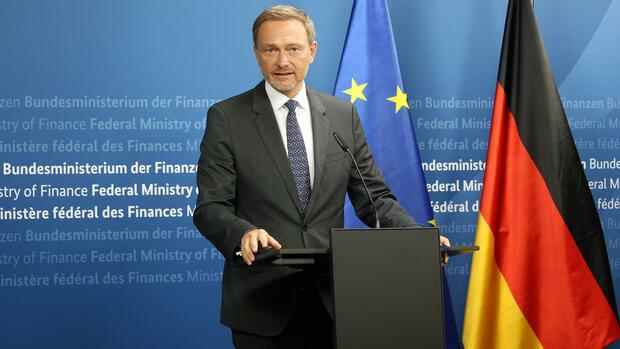The Federal Minister of Finance is advising his EU colleagues on reforming the debt rules.
(Photo: dpa)
Berlin Actually, the meeting of the European finance ministers on Friday and Saturday in Paris should deal with topics such as digital means of payment and the financing of innovations. But now the Ukraine war will be the main topic, a German government official expects. It was also said in French government circles that the agenda would be changed at short notice.
The current crisis is likely to be linked to another issue finance ministers are working on: the reform of EU debt rules. The high levels of debt in many countries after the corona pandemic have prompted calls to relax the requirements.
They are currently suspended anyway, but they are supposed to come into force again next year. But there are now doubts about this given the potential impact of the current crisis on the European economy. Another suspension is now conceivable.
The EU Commission intends to publish its recommendations for fiscal policy in 2023 next week. According to EU Monetary Affairs Commissioner Paolo Gentiloni, one will have to take into account the increasing uncertainty caused by the Russian attack on Ukraine, which is clouding the economic outlook.
Top jobs of the day
Find the best jobs now and
be notified by email.
Opponents of the Stability Pact now have a new argument at hand
The Ukraine war has the potential to choke off the emerging upswing in the EU, says Jürgen Matthes, head of international economic order at the German Economic Institute (IW). “If there were to be significant and prolonged growth losses, a further suspension of the Stability and Growth Pact would probably be unavoidable,” said Matthes.
France wants to accelerate the debate on how to deal with debt rules in the future during its EU Council Presidency in the first half of 2022. The issue is due to be raised at a summit of EU leaders in March on a “European model for growth and investment”.
Those in the EU who have been campaigning for a softening of the Stability Pact for some time now see the Ukraine war as a further argument in favor of this step. “We cannot meet tomorrow’s challenges with yesterday’s rules,” agrees Gentiloni. The new fiscal rules would have to match the challenges we are now facing.
At the meeting, the EU Commissioner will continue to advocate that states have to reduce their debt, but at the same time there should be sufficient scope for investment. So far, this demand has primarily been about investments in climate protection and digitization, but now another area is being added with defense spending.
IW economist Matthes warns against fundamentally shaking the debt limits. In general, the rules around the three percent limit for new borrowing would have an important signal character.
Rather than change it, the IW wants to create a spending rule to enforce the limit. If the level of debt is high, government spending should grow less than gross domestic product in the medium term. The debt ratio of 60 percent should not be touched either.
More: Plea for a global debt brake
